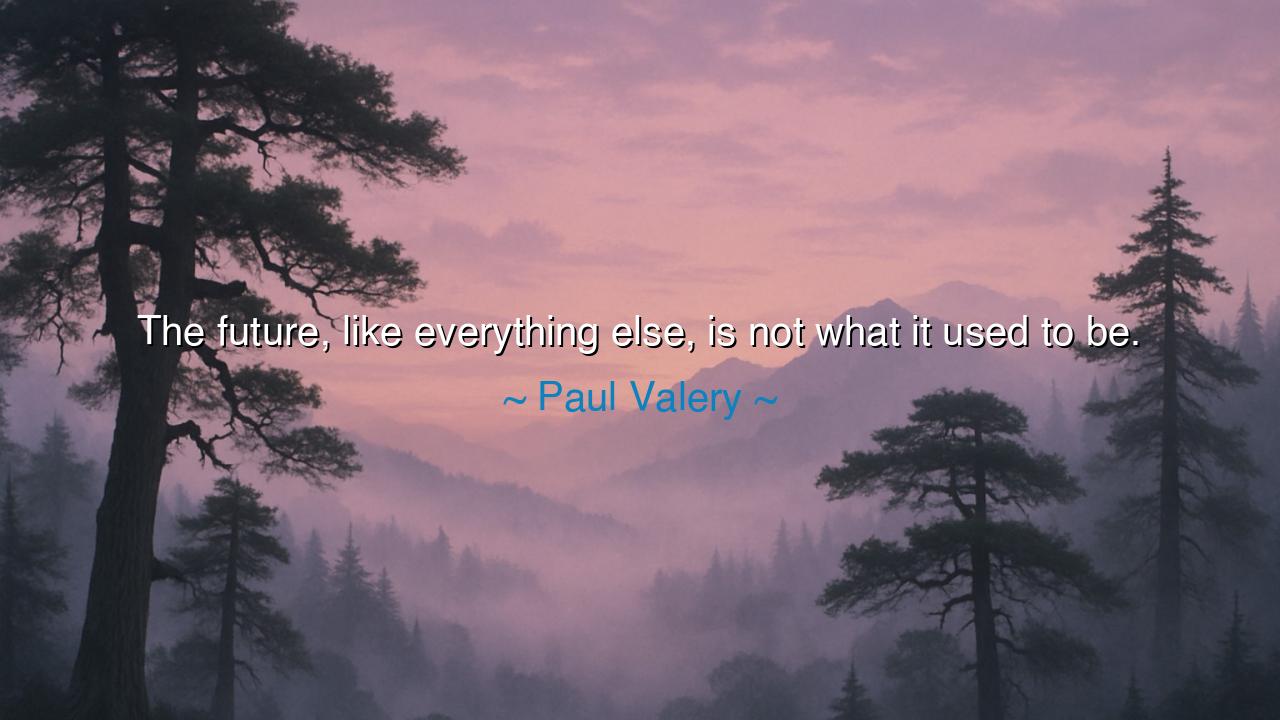
The future, like everything else, is not what it used to be.






In the endless flow of time, there is a universal truth that the future, like all things, is ever-changing. Paul Valéry’s words, "The future, like everything else, is not what it used to be," resonate with the ancient wisdom that change is the only true constant. The future, which once appeared certain and fixed, is now an ever-shifting landscape, shaped by the forces of progress, human action, and the unpredictable twists of fate. The future is no longer the realm of promise or certainty, but of possibility and uncertainty.
In the world of the ancients, the future was often seen as a tapestry woven with the threads of fate. The Greeks, for instance, spoke of the Fates—three powerful deities who spun, measured, and cut the thread of every life. To the ancients, the future was something predetermined, and the present was simply a fleeting moment between the threads of past and future. Yet, even then, the greatest thinkers, like Heraclitus, understood that change was inevitable. He famously declared, "You cannot step into the same river twice," for the river, like time, is constantly flowing, constantly changing. Valéry’s words echo this ancient wisdom: the future is not what it once was, because time itself is a river that can never be recaptured.
Consider the great philosophers of history, such as Socrates and Plato, whose ideas about the future were shaped by their views on knowledge and truth. For Socrates, the future was a matter of philosophical pursuit—an unending quest for wisdom and understanding, where the present could be molded by knowledge. Plato’s vision of the future, represented by the Allegory of the Cave, was one of transformation, where humanity could rise from the darkness of ignorance into the light of knowledge. For them, the future was not fixed but shaped by the actions and choices of individuals.
In the modern era, history itself teaches us how the future can shift dramatically. The Industrial Revolution stands as a stark reminder that the future, once believed to be a continuation of agrarian life, was transformed by human ingenuity and technological advancement. Just as the advent of the steam engine and mechanized factories reshaped societies and economies, so too did it reshape the future. People who once believed the future would unfold in familiar ways were confronted with a new world of endless innovation, new possibilities, and unforeseen challenges. The future was not what it used to be—it was something altogether new, full of promise and uncertainty.
This change in the nature of the future is not a force to be feared, but one to be embraced. The future is no longer something that simply happens to us, but something we actively create. The scientific advancements of today—whether in artificial intelligence, space exploration, or biotechnology—demonstrate that we now have the ability to shape the future in ways the ancients could never have imagined. The great explorers and inventors of history, like Leonardo da Vinci and Nikola Tesla, foresaw a world that was not bound by the past, but rather driven by the power of human imagination and innovation. Their vision of the future was radical, yet it paved the way for the technological marvels of today.
The lesson here is clear: adaptation is the key to navigating the ever-changing tides of time. Just as the ancients sought to understand the nature of time and change, so too must we understand that the future is no longer a place of certainty, but one of infinite potential. It is fluid, and it is shaped by our actions, our choices, and the collective will of humanity. The wisdom of the past teaches us that to thrive in an ever-changing world, we must not be bound by nostalgia or the rigid structures of the past, but rather we must embrace change and innovation with courage and vision.
In practical terms, we must look to the future not as something to fear, but as something to create. This means being open to new ideas, cultivating an adaptable mindset, and actively seeking ways to contribute to the world’s progress. Just as Socrates emphasized the importance of knowledge and self-examination, we must continually challenge our assumptions about the future and seek ways to shape it through informed action. By doing so, we take our place in the ongoing story of humanity, crafting a future that is not limited by what used to be, but defined by the boldness of our imagination and the wisdom of our choices.






AAdministratorAdministrator
Welcome, honored guests. Please leave a comment, we will respond soon